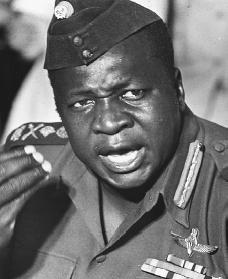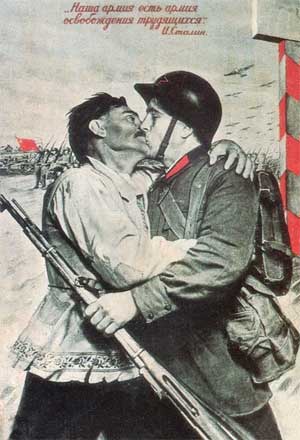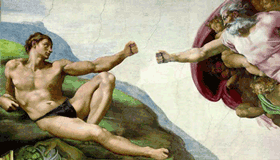7/23/2008, 4:42 pm
CHAPTER 2 - THE HIGH SKOOL YEARS
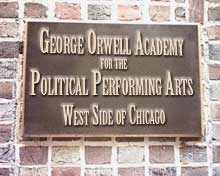 (Note from Obama: As I have said previously, my policy is to name this chapter "The High Skool Years"; it was never my policy to name this chapter anything else.)
(Note from Obama: As I have said previously, my policy is to name this chapter "The High Skool Years"; it was never my policy to name this chapter anything else.)
Barack Obama attended high school (or was it school, high? Nah, go with the first one) at the prestigious George Orwell Academy for the Political Performing Arts on the West Side of Chicago. There, he met his best friends for the next few years, Fat Albert and Rerun.
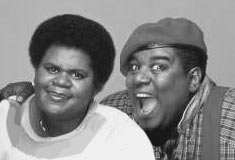 Fat Albert was likable and very outgoing, but he could be rather shallow; you could almost think of him as two-dimensional. Rerun was a rotund fellow who loved revolutionary dance, although the spinning around made him dizzy. Rerun's most notable affect on the young Obama's life was to introduce Barack to his sister, Dee, who would later become Mrs. Obama. They immediately shared much in common, such as a love of Marxist Comedy and a propensity for name changes.The Orwell School was very high on sloganeering; in fact, the walls of the building were loaded with them. Phrases like "Freedom is Slavery" and "War is Peace" and "Buy Band Candy or Die!" importuned the eye wherever one looked, imprinting their kindly Stalinist messages into the mush of young brains. Obama was impressed with the messages, especially the band candy one.
Fat Albert was likable and very outgoing, but he could be rather shallow; you could almost think of him as two-dimensional. Rerun was a rotund fellow who loved revolutionary dance, although the spinning around made him dizzy. Rerun's most notable affect on the young Obama's life was to introduce Barack to his sister, Dee, who would later become Mrs. Obama. They immediately shared much in common, such as a love of Marxist Comedy and a propensity for name changes.The Orwell School was very high on sloganeering; in fact, the walls of the building were loaded with them. Phrases like "Freedom is Slavery" and "War is Peace" and "Buy Band Candy or Die!" importuned the eye wherever one looked, imprinting their kindly Stalinist messages into the mush of young brains. Obama was impressed with the messages, especially the band candy one.
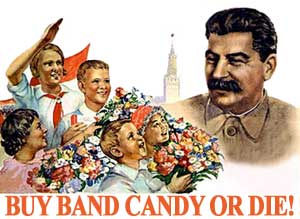 The strategy of sloganeering seemed an ideal one for building revolutionary fervor in the hearts and minds of the oppressed masses. As a political weapon, it is a masterstroke; a minimal amount of data for low-information proletariat types to remember, yet an almost hypnotic effect from the repetition of the message. Obama was excited at his discovery! He wanted to rush home and tell mom the news, but first he had to go and buy some band candy or the telescreen would report him.
The strategy of sloganeering seemed an ideal one for building revolutionary fervor in the hearts and minds of the oppressed masses. As a political weapon, it is a masterstroke; a minimal amount of data for low-information proletariat types to remember, yet an almost hypnotic effect from the repetition of the message. Obama was excited at his discovery! He wanted to rush home and tell mom the news, but first he had to go and buy some band candy or the telescreen would report him.
Obama's favorite subject in high school was Parliamentary Melodrama, taught by Mr. Trotsky. Despite Barack's love of the subject, his class participation was minimal and his report cards show him merely as "present" for these sessions on most days. Even worse, Barack persistently fell behind in Chemistry where his project to develop a Revolution-Promoting Extremely-Rapid Oxidation Device was, to coin a phrase, a dud. Luckily his lab partner little Billy Ayers was an expert in such matters, having blown up many tools of the oppressors in his mansion as a child. Billy was happy to help Barack out; in fact, he was always wishing he could do more, at least when it came to explosions.
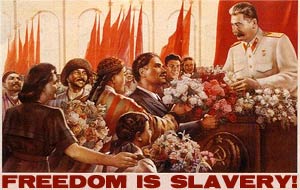 In contrast, girlfriend Dee (whose name was now Aretha) was doing excellently in school. Her best subject was Anti-Imperialist English where she won a Double Plus Very Good Award for her essay, "If You Don't Give Me A Good Mark for This, You're A Racist!"
In contrast, girlfriend Dee (whose name was now Aretha) was doing excellently in school. Her best subject was Anti-Imperialist English where she won a Double Plus Very Good Award for her essay, "If You Don't Give Me A Good Mark for This, You're A Racist!"
It wasn't that Barack was not bright, for as we all now know he is the brightest person there ever was or ever will be on this planet and probably lots of other planets we don't know about yet. No, the problem was that his great mind was on other things, bigger gooder things like bringing Hope and Change to the World and probably lots of other worlds we don't know about yet. But it might be hard because most people are too stupid to recognize brilliance when they see it; brilliance can only be recognized by the brilliant but they can only recognize some of the brilliance because you cannot recognize all the brilliance of someone more brilliant than you. That idea likely came from one of Chairman Mao's little Red Books that all the brilliant people were reading at the time.
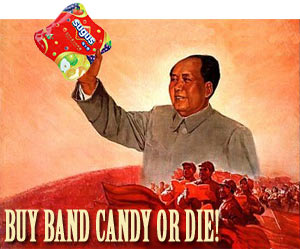 Chairman Mao's other brilliant idea was to eradicate all the dummies who were not brilliant enough to recognize the brilliance in Chairman Mao. Would that work in the United States? Probably not, because the media was not in the control of Party functionaries as they were in progressive societies (Ed. note: It's true! They really WEREN'T back then! Hard to believe, isn't it?).
Chairman Mao's other brilliant idea was to eradicate all the dummies who were not brilliant enough to recognize the brilliance in Chairman Mao. Would that work in the United States? Probably not, because the media was not in the control of Party functionaries as they were in progressive societies (Ed. note: It's true! They really WEREN'T back then! Hard to believe, isn't it?).
Media organs that reported news instead of performing their primary function of promoting progressive political agendas could foment counter-revolutionary movements among the unwashed. The downtrodden would lose sight of the current truth and start believing the newspapers because they contained comics and money-off coupons on toilet paper. No, unfortunately, the American downtrodden had to be CONVINCED of the superior person's correctness; they couldn't simply be told what to do, which is how it usually happens in more enlightened and progressive societies.
But how?
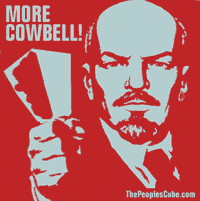 The answer came as Barack munched on some band candy: the slogan! Why had the capitalist oppressors succeeded in foisting the reactionary pig Richard Nixon on the American workers in 1972 instead of the enlightened President McGovern? It was so simple, it was brilliant - Nixon had a much better slogan than McGovern!
The answer came as Barack munched on some band candy: the slogan! Why had the capitalist oppressors succeeded in foisting the reactionary pig Richard Nixon on the American workers in 1972 instead of the enlightened President McGovern? It was so simple, it was brilliant - Nixon had a much better slogan than McGovern!
Nixon's slogan in 1972 was "Four More Years". It was clear, direct and left the huddled voter with plain instructions: "Give me four more years of power and then go on with your worthless little lives." There also was a touch of unspoken threat to it, a tacit demand that helped focus the simple minds of the simple-minded.
In contrast, President McGovern's slogan was "Come home, America!" What the hell was that? It sounded as if he was calling his dog! The easily-duped voter would be sitting in his living room and say to himself, "What's he talking about? I already AM home!"
This was a key insight from the brilliant mind of Obama. The average person retains no more than a few tidbits of information. Everyone remembers the words to the Winston Cigarette jingle ("Winston tastes good like a cigarette should!") but nobody remembers the Preamble to the Constitution ("Four score and seven years ago, our forefathers brought forth a new nation...") Why? Unlike the preamble, the jingle has the virtues of being short and easy to remember and contains no complex ideas.
Political campaigns back then were full of junk like platforms and philosophies and positions; there were just too many "P's" for the average downtrodden to be able to sort through and come up with the correct vote! Why confuse the unwashed with facts and figures that they are ill-equipped to deal with, and risk their wrong decision? Ideas were useless baggage in a Presidential campaign, pearls before the swine American voter. A slogan is all he would need; tell the voter what to do, instead of hoping he would come up with the right answer.
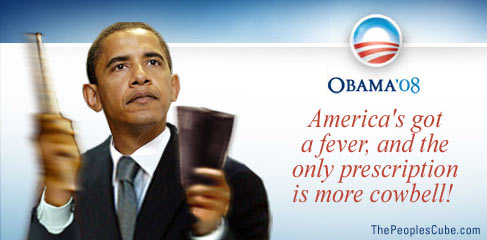
Barack set to work on developing his slogan, one that would mesmerize, control, and instruct the average downtrodden in a few key words. Below are some of his early attempts:
"Trust me, I know what I'm doing!"
"Obama does good like a President should!"
"Buy band candy or die!"
"You're hopeless but you can change if you have to, you guess."
"Believe that we can hope to change!"
COMING SOON: Another Chapter I will change the name of but will tell you I didn't and the media will report it as fact!

Barack Obama attended high school (or was it school, high? Nah, go with the first one) at the prestigious George Orwell Academy for the Political Performing Arts on the West Side of Chicago. There, he met his best friends for the next few years, Fat Albert and Rerun.


Obama's favorite subject in high school was Parliamentary Melodrama, taught by Mr. Trotsky. Despite Barack's love of the subject, his class participation was minimal and his report cards show him merely as "present" for these sessions on most days. Even worse, Barack persistently fell behind in Chemistry where his project to develop a Revolution-Promoting Extremely-Rapid Oxidation Device was, to coin a phrase, a dud. Luckily his lab partner little Billy Ayers was an expert in such matters, having blown up many tools of the oppressors in his mansion as a child. Billy was happy to help Barack out; in fact, he was always wishing he could do more, at least when it came to explosions.

It wasn't that Barack was not bright, for as we all now know he is the brightest person there ever was or ever will be on this planet and probably lots of other planets we don't know about yet. No, the problem was that his great mind was on other things, bigger gooder things like bringing Hope and Change to the World and probably lots of other worlds we don't know about yet. But it might be hard because most people are too stupid to recognize brilliance when they see it; brilliance can only be recognized by the brilliant but they can only recognize some of the brilliance because you cannot recognize all the brilliance of someone more brilliant than you. That idea likely came from one of Chairman Mao's little Red Books that all the brilliant people were reading at the time.

Media organs that reported news instead of performing their primary function of promoting progressive political agendas could foment counter-revolutionary movements among the unwashed. The downtrodden would lose sight of the current truth and start believing the newspapers because they contained comics and money-off coupons on toilet paper. No, unfortunately, the American downtrodden had to be CONVINCED of the superior person's correctness; they couldn't simply be told what to do, which is how it usually happens in more enlightened and progressive societies.
But how?

Nixon's slogan in 1972 was "Four More Years". It was clear, direct and left the huddled voter with plain instructions: "Give me four more years of power and then go on with your worthless little lives." There also was a touch of unspoken threat to it, a tacit demand that helped focus the simple minds of the simple-minded.
In contrast, President McGovern's slogan was "Come home, America!" What the hell was that? It sounded as if he was calling his dog! The easily-duped voter would be sitting in his living room and say to himself, "What's he talking about? I already AM home!"
This was a key insight from the brilliant mind of Obama. The average person retains no more than a few tidbits of information. Everyone remembers the words to the Winston Cigarette jingle ("Winston tastes good like a cigarette should!") but nobody remembers the Preamble to the Constitution ("Four score and seven years ago, our forefathers brought forth a new nation...") Why? Unlike the preamble, the jingle has the virtues of being short and easy to remember and contains no complex ideas.
Political campaigns back then were full of junk like platforms and philosophies and positions; there were just too many "P's" for the average downtrodden to be able to sort through and come up with the correct vote! Why confuse the unwashed with facts and figures that they are ill-equipped to deal with, and risk their wrong decision? Ideas were useless baggage in a Presidential campaign, pearls before the swine American voter. A slogan is all he would need; tell the voter what to do, instead of hoping he would come up with the right answer.

Barack set to work on developing his slogan, one that would mesmerize, control, and instruct the average downtrodden in a few key words. Below are some of his early attempts:
"Trust me, I know what I'm doing!"
"Obama does good like a President should!"
"Buy band candy or die!"
"You're hopeless but you can change if you have to, you guess."
"Believe that we can hope to change!"
COMING SOON: Another Chapter I will change the name of but will tell you I didn't and the media will report it as fact!




